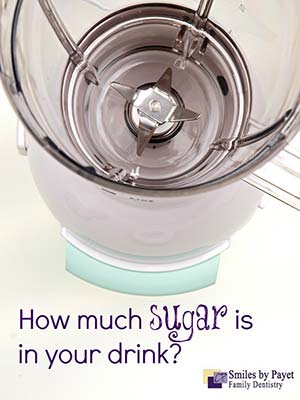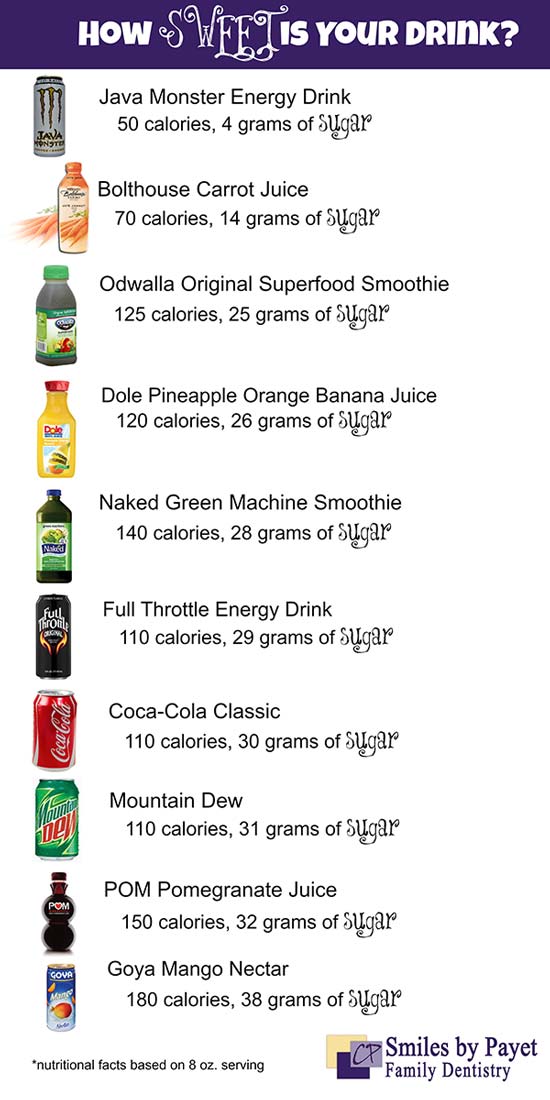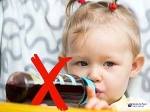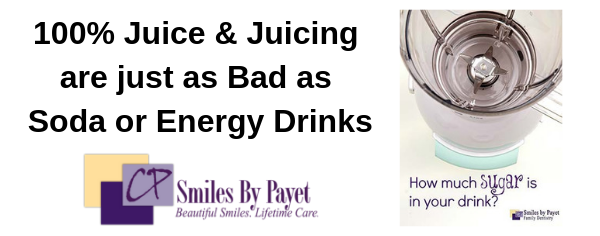Back on December 1st 2014, Forbes.com published an article on a study with the headline: Pure Juice Won’t Rot Your Kids’ Teeth. It didn’t get a lot of attention, thank goodness, because while the article was factual, it significantly overstated the conclusion, much like the 2015 Newsweek article claiming a non-existent link between fluoride and ADHD, which I recently debunked. Since I’ve been reading a lot of claims on social media that fruit juices, juicing, and energy drinks are healthier for you and your teeth than sodas, this seemed a good time to continue my series on science in medicine and dentistry. It also follows nicely on my recent article Why I Don’t Buy Organic because it emphasizes why I’m skeptical about all kinds of fads.
To be clear – I have nothing against juicing, 100% juice, organic juice, whatever kind of juice if you like it. You just need to be aware of potential risks associated with juicing, 100% juice, or energy drinks. As reassurance, at the end of this article, I provide recommendations on how to best avoid cavities and acid erosion of your teeth if you like juicing.
How can Juice Be Bad for You?

In the last few years, juicing has become increasingly popular. Proponents of juicing diets claim miraculous cures and improvements in your health. Even “normal” juices are seeing huge increases in sales, and the growing trend in organic foods and drinks is huge. Parents see bottles labeled “100% Fruit Juice” and are lulled into thinking that means they are only healthy and have no side effects. On top of that, the growth of the “energy drink” industry is staggering, and many of their claims are health-related.
But as dentists will tell you, these trends aren’t necessarily any better for your teeth; realistically, they aren’t any better for your health, either. And as with most things that are bad for teeth, there are 2 main problems: sugars and acids.
Juicing Concentrates the Nutrients, Sugars & Acids
It is true that pulverizing a lot of fruits and vegetables into a delicious smoothie gives you a tremendous concentration of the vitamins and minerals present in your selections. What most people don’t realize, however, is that juicing also concentrates all the sugars and acids, while also destroying all of the fibrous texture. This concentrated sugar is then instantly available to the bacteria in your mouth, and regardless what people try to tell you, those bacteria don’t care if it is fructose, sucrose, processed, organic, “all-natural,” etc. It’s sugar! And since those bacteria also thrive in an acidic environment, they LOVE the lowered pH in your mouth. Acid and sugar are a very bad combination for your teeth.
In the Mouth, Sugar is Sugar & is ALL Bad
Here’s the thing about sugar in your mouth – it really doesn’t matter if you’re talking about sucrose, glucose, or fructose – they’re all bad. That’s not to say that they all have the same effect, but every single one contributes to tooth decay through metabolism by the primary bacteria that causes tooth decay: Streptococcus mutans, usually shortened to S. mutans.
- Sucrose is directly metabolized to form a polysaccharide that forms dental plaque, which is that nasty film on your teeth that builds up over time. If it stays in place too long, the minerals naturally present in your saliva are absorbed into the plaque and harden it to form calculus, aka tartar.
- Glucose and Fructose are both directly metabolized to lactic acid, which keeps your mouth acidic and breaks down the mineral matrix of tooth enamel.
- Organic sugar and GMO sugar are chemically identical – the bacteria can’t tell and don’t care, so forget about organic sugar being healthier. Nor do they care if the sugar came from fresh or frozen foods, processed or raw. It’s sugar.
Have You Looked at the Labels for “100% Fruit Juices” Lately?

When I was thinking about this article, I was at the Harris Teeter and started picking up various brands of juice labeled “100% Fruit Juice,” and I have to tell you – I was SHOCKED at how much sugar many of them have – often higher than sodas. After all, every one of these juices is “100% juice” and “all-natural” and some are even organic. Are they really healthier than soda? Sure, they might have more vitamins and minerals, but with that much sugar? After all – calories are calories in the end.
Energy Drinks are As Bad or Worse
As much as dentists have long advocated against sodas, we see an emerging epidemic of decay and erosion from sports and energy drinks. It’s easy to see from the infographic that they are no better than the juices or sodas.
The Danger of Baby Bottle Decay
 As you can see from the graphic, this is why dentists strongly recommend NOT giving infants or toddlers juice in their bottles at night or during naps. Prolonged exposure to this much sugar can rot baby teeth incredibly fast. At night or for naps, the best drink is just water if you’re leaving the bottle with your child. If you’re giving them juice, let them drink it and then take the bottle away.
As you can see from the graphic, this is why dentists strongly recommend NOT giving infants or toddlers juice in their bottles at night or during naps. Prolonged exposure to this much sugar can rot baby teeth incredibly fast. At night or for naps, the best drink is just water if you’re leaving the bottle with your child. If you’re giving them juice, let them drink it and then take the bottle away.
BTW – even milk has lactose (sugar) and can cause baby bottle decay, so it really is best to not let an infant keep the bottle and sip/suck on it for extended times unless it’s water. 🙂
Moderation is Key
When it comes to eating and drinking, the majority of the science on nutrition (despite what all the fads tell you) still falls firmly along the idea that moderation is key & overdoing anything is usually bad for you. That means you are perfectly fine if you like juicing, 100% juice, conventional or organic juice, even sodas and energy drinks – in moderation! I confess that I like a Coke every once in a while, although I can rarely finish even 1 can at a time. I use raw sugar in my coffee. I like the Naked Blue Machine Smoothie occasionally. But I don’t overdo it on any of them. It’s fine – don’t stress about it if you like them, too, just be aware of the risks along with the benefits.
Minimizing Risk of Cavities with Juicing, Sodas, Etc
OK, so let’s say that you like a glass of sweet Southern Iced Tea, or a Bolthouse smoothie, or a Monster Energy Drink, or Coke, or you do your own juicing at home, or purchase 100% juice at the store, how do you minimize the risk of getting cavities? Here are a few suggestions:
- Drink through a straw and don’t swish. This decreases the direct sugar exposure on your teeth.
- Don’t sip a drink for hours, but drink it fairly quickly. This lets your saliva start balancing out the acidity in your mouth faster.
- If you take several large gulps of Coke, it can take up to 60 minutes before the pH of your mouth returns to normal.
- The longer your oral environment stays acidic, the longer the bacteria are pumping out more acid from the sugar and damaging your enamel.
- Swish thoroughly with water after any of these drinks.
- Do NOT brush your teeth for a minimum of 20 minutes after these drinks. Again, this lets your body neutralize the acidity first.
- Adding an abrasive toothpaste of any kind on enamel that’s already been weakened by acid will break the enamel down faster.
- Use a fluoride-containing mouthrinse for 1 minute every morning and every night
- Avoid mouthrinses with alcohol, which dries out the mouth and decreases your salivary protection temporarily.
- See your dentist regularly for checkups and consider extra protective measures:
- Fluoride varnishes
- Prescription strength fluoride toothpastes such as Prevident
You can learn more by reading up on some related articles that I’ve written in the past on sugar, acidity, “soft teeth,” etc:
- What are “Soft Teeth?”
- My Baby Stole the Calcium from my Teeth!
- All Sodas Cause Cavities
- What Does Heartburn Have to Do with Teeth?
- Acid Erosion Due to Bulimia
- For more information about the dangers of Energy Drinks, which I barely touched on here, the WHO has recently come out with a report on the dangers of such beverages in children and teenagers – do NOT let your kids have this stuff! Energy Drinks a Public Health Hazard







